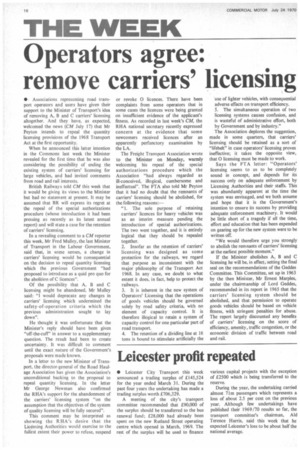THE WEEK
Page 18

If you've noticed an error in this article please click here to report it so we can fix it.
Operators agree: remove carriers' licensing
• • Associations representing road transport operators and users have given their support to the Minister of Transport's idea of removing A, B and C carriers' licensing altogether. And they have, as expected, welcomed the news (CM July 17) that Mr Peyton intends to repeal the quantity licensing provisions of the 1968 Transport Act at the first opportunity.
When he announced this latter intention in the Commons last week the Minister revealed for the first time that he was also considering the possibility of ending the existing system of carriers' licensing for large vehicles, and had invited comments from road and rail interests.
British Railways told CM this week that it would be giving its views to the Minister but had no statement at present. It may be assumed that BR will express its regret at the repeal of the special authorizations procedure (whose introduction it had been pressing as recently as its latest annual report) and will state a case for the retention of carriers' licensing.
In a revealing comment to a CM reporter this week, Mr Fred Mulley, the last Minister of Transport in the Labour Government, said that, in some senses, a change in carriers' licensing would be consequential on the decision to repeal quantity licensing which the previous Government "had proposed to introduce as a quid pro quo for the abolition of C licences".
Of the possibility that A. B and C licensing might be abandoned, Mr Mulley said: "1 would deprecate any changes in carriers' licensing which undermined the safety-of-operation criteria which the previous administration sought to lay down".
He thought it was unfortunate that the Minister's reply should have been given "off-the-cuff" in answer to a supplementary question. The result had been to create uncertainty. It was difficult to comment until the exact nature of the Government's proposals were made known.
In a letter to the new Minister of Transport, the director-general of the Road Haulage Association has given the Association's unconditional backing to the proposal to repeal quantity licensing. In the letter Mr George Newman also confirmed the RHA's support for the abandonment of the carriers' licensing system "on the assumption that the objectives of the system of quality licensing will be fully secured".
This comment may be interpreted as showing the RHA's desire that the Licdnsing Authorities would exercise to the fullest extent their power to refuse, suspend or revoke 0 licences. There have been complaints from some operators that in some cases the licences were being granted on insufficient evidence of the applicant's fitness. As recorded in last week's CM, the RHA national secretary recently expressed concern at the evidence that some newcomers received licences after an apparently perfunctory examination by the LA.
The Freight Transport Association wrote to the Minister on Monday, warmly welcoming his repeal of the special authorizations procedure which the Association "had always regarded as
ill-conceived, illogical, cumbersome and ineffectual". The FTA also told Mr Peyton that it had no doubt that the remnants of carriers' licensing should be abolished, for the following reasons:—
"1. The sole purpose of retaining carriers' licences for heavy vehicles was as an interim measure pending the introduction of special authorizations. The two went together, and it is entirely logical that they should be repealed together.
2. Insofar as the retention of carriers' licensing was designed as some protection for the railways, we regard that purpose as inconsistent with the major philosophy of the Transport Act 1968. In any case, we doubt to what extent it does, in fact, help to protect the railways.
3. It is inherent in the new system of Operators' Licensing that the operations of goods vehicles should be governed solely by road safety criteria, with no element of capacity control. It is therefore illogical to retain a system of capacity control for one particular part of road transport.
4. The retention of a dividing line at 16 tons is bound to stimulate artificially the use of lighter vehicles, with consequential adverse effects on transport efficiency.
5. The simultaneous operation of two licensing systems causes confusion, and is wasteful of administrative effort, both by Government and by industry."
The Association deplores the suggestion, made in some quarters, that carriers' licensing should be retained as a sort of "lifebelt" in case operators' licensing proves ineffective; it takes the opposite view, that 0 licensing must be made to work.
Says the FTA letter: "Operators' licensing seems to us to be completely sound in concept, and depends for its success only on adequate enforcement by Licensing Authorities and their staffs. This was abundantly apparent at the time the system was envisaged, and we both assume and hope that it is the Government's intention to ensure its success by providing adequate enforcement machinery. It would be little short of a tragedy if all the time, effort and education that has been expended on gearing up for the new system were to be written off.
"We would therefore urge you strongly to abolish the remnants of carriers' licensing at the earliest possible moment."
If the Minister abolishes A, B and C licensing he will be, in effect, setting the final seal on the recommendations of the Geddes Committee. This Committee, set up in 1963 by the then Minister, Mr Ernest Marples, under the chairmanship of Lord Geddes, recommended in its report in 1965 that the carriers' licensing system should be abolished, and that permission to operate goods vehicles should be based on vehicle fitness, with stringent Penalties for abuse.
The report largely discounted any benefits of carriers' licensing on the score of efficiency, amenity, traffic congestion, or the economic division of traffic between road and rail.























